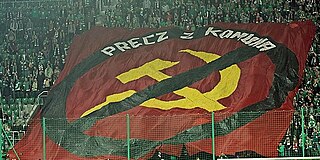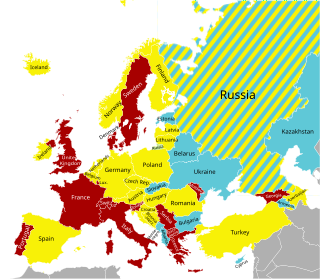Marxism–Leninism is a communist ideology that became the largest faction of the communist movement in the world in the years following the October Revolution. It was the predominant ideology of most socialist governments throughout the 20th century. Developed in Russia by the Bolsheviks, it was the state ideology of the Soviet Union, Soviet satellite states in the Eastern Bloc, and various countries in the Non-Aligned Movement and Third World during the Cold War, as well as the Communist International after Bolshevization.
A communist party is a political party that seeks to realize the socio-economic goals of communism. The term "communist party" was popularized by the title of The Manifesto of the Communist Party (1848) by Karl Marx and Friedrich Engels. As a vanguard party, the communist party guides the political education and development of the working class (proletariat). As a ruling party, the communist party exercises power through the dictatorship of the proletariat. Vladimir Lenin developed the idea of the communist party as the revolutionary vanguard, when the socialist movement in Imperial Russia was divided into ideologically opposed factions, the Bolshevik faction and the Menshevik faction. To be politically effective, Lenin proposed a small vanguard party managed with democratic centralism which allowed the centralized command of a disciplined cadre of professional revolutionaries. Once a policy was agreed upon, realizing political goals required every Bolshevik's total commitment to the agreed-upon policy.
The Zinoviev letter was a fake document published and sensationalised by the British Daily Mail newspaper four days before the 1924 United Kingdom general election, which was held on 29 October. The letter purported to be a directive from Grigory Zinoviev, the head of the Communist International (Comintern) in Moscow, to the Communist Party of Great Britain (CPGB), ordering it to engage in seditious activities. It stated that the normalisation of British–Soviet relations under a Labour Party government would radicalise the British working class and put the CPGB in a favourable position to pursue a Bolshevik-style revolution. It further suggested that these effects would extend throughout the British Empire. The right-wing press depicted the letter as a grave foreign subversion of British politics and blamed the incumbent Labour government under Ramsay MacDonald for promoting the policy of political reconciliation and open trade with the Soviet Union on which the scheme appeared to depend. The election resulted in the fall of the first Labour government and a strong victory for the Conservative Party and the continued collapse of the Liberal Party. Labour supporters often blamed the letter, at least in part, for their party's defeat.

Socialist realism was the official cultural doctrine of the Soviet Union that mandated an idealized representation of life under socialism in literature and the visual arts. The doctrine was first proclaimed by the First Congress of Soviet Writers in 1934 as approved method for Soviet cultural production in all media. Following World War II, socialist realism was adopted by countries politically aligned with the Soviet Union. The primary official objective of socialist realism was "to depict reality in its revolutionary development" although no formal guidelines concerning style or subject matter were provided.
A Red Scare is a form of moral panic provoked by fear of the rise, supposed or real, of leftist ideologies in a society, especially communism. Historically, "red scares" have led to mass political persecution, scapegoating, and the ousting of those in government positions who have had connections with left-wing to far-left ideology. The name is derived from the red flag, a common symbol of communism.
An apparatchik was a full-time, professional functionary of the Communist Party of the Soviet Union or the Soviet government apparat, someone who held any position of bureaucratic or political responsibility, with the exception of the higher ranks of management called nomenklatura. James Billington describes an apparatchik as "a man not of grand plans, but of a hundred carefully executed details." The term is often considered derogatory, with negative connotations in terms of the quality, competence, and attitude of a person thus described.

The term comrade generally means 'mate', 'colleague', or 'ally', and derives from the Spanish and Portuguese, term camarada, literally meaning 'chamber mate', from Latin camera, meaning 'chamber' or 'room'. It may also specifically mean "fellow soldier". Political use of the term was inspired by the French Revolution, after which it grew into a form of address between socialists and workers. Since the Russian Revolution, popular culture in the West has often associated it with communism.
Żydokomuna is an anti-communist and antisemitic canard, or a pejorative stereotype, suggesting that most Jews collaborated with the Soviet Union in importing communism into Poland, or that there was an exclusively Jewish conspiracy to do so. A Polish language term for "Jewish Bolshevism", or more literally "Jewish communism", Żydokomuna is related to the "Jewish world conspiracy" myth.

Comrade X is a 1940 American comedy spy film directed by King Vidor and starring Clark Gable and Hedy Lamarr. The supporting cast features Oskar Homolka, Felix Bressart, Sig Rumann and Eve Arden. In February 2020, the film was shown at the 70th Berlin International Film Festival, as part of a retrospective dedicated to King Vidor's career.
"Engineers of the human soul" was a term applied to writers and other cultural workers by Joseph Stalin.
Russian political jokes are a part of Russian humour and can be grouped into the major time periods: Imperial Russia, Soviet Union and post-Soviet Russia. In the Soviet period political jokes were a form of social protest, mocking and criticising leaders, the system and its ideology, myths and rites. Quite a few political themes can be found among other standard categories of Russian joke, most notably Rabinovich jokes and Radio Yerevan.
Jewish Bolshevism, also Judeo–Bolshevism, is an antisemitic conspiracy theory that claims that the Russian Revolution of 1917 was a Jewish plot and that Jews controlled the Soviet Union and international communist movements, often in furtherance of a plan to destroy Western civilization. It was one of the main Nazi beliefs that served as an ideological justification for the German invasion of the Soviet Union and the Holocaust.

Prohibition in the Russian Empire and the Soviet Union existed during 1914–25. The Russian term is "сухой закон".
Communism is a left-wing to far-left sociopolitical, philosophical, and economic ideology within the socialist movement, whose goal is the creation of a communist society, a socioeconomic order centered around common ownership of the means of production, distribution, and exchange that allocates products to everyone in the society based on need. A communist society would entail the absence of private property and social classes, and ultimately money and the state.
Russian studies is an interdisciplinary field crossing politics, history, culture, economics, and languages of Russia and its neighborhood, often grouped under Soviet and Communist studies. Russian studies should not be confused with the study of the Russian literature or linguistics, which is often a distinct department within universities.

Anti-communism is political and ideological opposition to communist beliefs, groups, and individuals. Organized anti-communism developed after the 1917 October Revolution in the Russian Empire, and it reached global dimensions during the Cold War, when the United States and the Soviet Union engaged in an intense rivalry. Anti-communism has been an element of many movements and different political positions across the political spectrum, including anarchism, centrism, conservatism, fascism, liberalism, nationalism, social democracy, socialism, leftism, and libertarianism, as well as broad movements resisting communist governance. Anti-communism has also been expressed by several religious groups, and in art and literature.

Alcohol preferences in Europe vary from country to country between beer, wine or spirits. These preferences are traditionally associated with certain regions. Hence, the Central European pattern of alcohol consumption is associated with beer-drinking, the Mediterranean pattern with wine-drinking and the Eastern or Northern European pattern with spirit-drinking countries. However, traditional preferences do not necessarily correspond to current drinking habits, as beer has become the most popular alcoholic drink world-wide.

"Left-Wing" Communism: An Infantile Disorder is a work by Vladimir Lenin attacking assorted critics of the Bolsheviks who claimed positions to their left. Most of these critics were proponents of ideologies later described as left communism. The book was written in 1920 and published in Russian, German, English and French later in the year. A copy was then distributed to each delegate at the 2nd World Congress of the Comintern, several of whom were mentioned by Lenin in the work. The book is divided into ten chapters and an appendix.

The All-Union Leninist Young Communist League, usually known as Komsomol, was a political youth organization in the Soviet Union. It is sometimes described as the youth division of the Communist Party of the Soviet Union (CPSU), although it was officially independent and referred to as "the helper and the reserve of the CPSU".
Anti anti-communism is opposition to anti-communism as applied in the Cold War. The term was first coined by Clifford Geertz, an American anthropologist at the Institute for Advanced Study, who defined it as being applied in "the cold war days" by "those who ... regarded the [Red] Menace as the primary fact of contemporary political life" to "[t]hose of us who strenuously opposed [that] obsession, as we saw it ... with the insinuation – wildly incorrect in the vast majority of cases – that, by the law of the double negative, we had some secret affection for the Soviet Union." Stated more simply by Kristen Ghodsee and Scott Sehon, "the anthropologist Clifford Geertz wrote that you could be 'anti anti-communism' without being in favour of communism."







